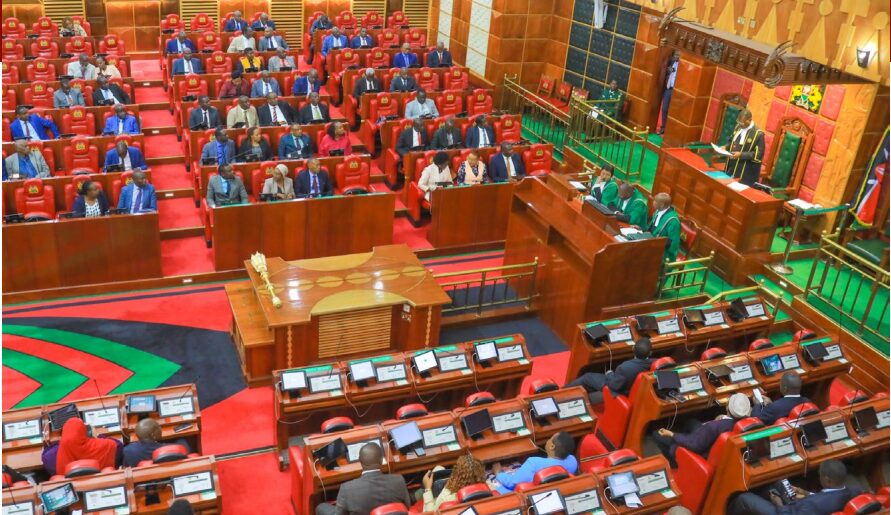Standoff: Devolution under threat

“Devolution is under immense threat, being starved of resources thereby crippling counties’ ability to offer essential services to Kenyans,” Wajir County Governor and Chairperson Council of Governors (CoG), Ahmed Abdullahi.
Since the inception of devolution in 2013, county governments have lamented a cash crunch, and county chiefs frequently threaten to shut down services.
This year, for the first time in the history of devolution, Kenya has witnessed Parliament amend the division of revenue not once but twice.
On Wednesday afternoon, the House (Senate) voted to reject the mediated version of the Bill since it had decreased from the initial KES400.117 billion to KES387 billion.
“It is definitely not enough because in the prior year, county governments received KES385 billion. So, it is a very superficial increment of KES2 billion. Now, there is inflation, and whenever you are making budgets, you must put in or factor in inflationary pressure,” said Moses Kajwang’, Senator for Homa Bay County and Chairperson of the Public Accounts Committee in the Senate.
In an interview on KBC TV on Wednesday night, Senator Kajwang’ said, “Devolution is under threat, and if we (Parliament) don’t manage these fiscal and mandatory Bills properly, we (Parliament) are going to kill counties.”
The Homa Bay Senator added that beyond inflationary pressure, there is what is called non-discretionary expenditure that has been occasioned by the new tax laws. “New tax laws – the contributions that counties are going to make. For example, the Housing Fund has gone up in terms of several billions. The contributions that counties are making to the Social Health Authority (SHA) have also gone up. It means that counties cannot avoid incurring that expenditure. Additionally, it means counties are going to have less money than they had in the past financial year.”
According to Senator Kajwang’, the earlier mediated amount of KES400.117 billion was fair enough. “It would enable county governments to take care of the non-discretionary expenditure that has come along as a result of national government priorities.”
Last week, the Council of Governors (CoG) threatened to halt crucial services, including healthcare, due to the prolonged delay by the National Treasury in releasing funds.
The counties had not received funds for a record three months, stalling services in nearly all 47 county governments.
With Parliament deliberating over the Division of Revenue (Amendment) Bill 2024, CoG has affirmed that it supports the Senate’s decision to retain County Allocation at KES400.117 billion. CoG says this will help the county governments implement the devolved functions.
The Division of Revenue (Amendment) Bill, 2024, and Enactment of the County Allocation of Revenue Bill more than five months into the financial year 2024/25, the County Allocation of Revenue Act has not been assented to.

This is despite the Bill being passed by both houses of Parliament. Due to these protracted deliberations, county governments continue to bear the brunt as they are yet to receive their Equitable Allocation for the current financial year.
In contrast, the national government continues to receive its shareable revenue as the National Assembly passed the Supplementary Appropriations Act 2024.
Hence, CoG stated that it takes great exception to the National Assembly’s decision to reduce the County Equitable Share by KES20 billion. Any reduction will negatively affect service delivery and grind the counties to a halt, considering that the allocated amount of KES400.117 billion is based on historical audited accounts.
The CoG holds the position that the Supplementary Appropriations Act, 2024, based on the Division of Revenue Amendment Bill, is unprocedural and unconstitutional since it is not based on the Division of Revenue Act, 2024.
“The Act is based on figures contained in a Bill that is currently before the mediation committee of Parliament. This goes against a Supreme Court Advisory Reference No.3 of 2019, which stipulated that Parliament cannot pass an Appropriation Bill before finalisation of the Division of Revenue Bill,” CoG stated.
County chiefs see this as an affront to devolution and an overt attempt to weaken and undermine the devolved governance structure enshrined in the constitution.
Status on disbursement of Equitable Share and release of funds pursuant to Regulation 134 of the Public Finance Management (National Government) Regulations, 2015 are read with the Supreme Court Advisory Opinion No.3 of 2019 and the Attorney General’s advisory opinion of September 2024. Counties are to receive up to 50 percent of the Equitable Share based on financial year 2023/24’s allocations.
The National Treasury is yet to disburse KES63.6 billion for October and November 2014 allocations. However, by December 2024, the 50% will have been exhausted, which means counties will not receive any disbursement from January 2025.
“We therefore call upon the Senate to expeditiously pass the County Allocation of Revenue Act to resolve this delay. Additionally, we demand that the National Treasury immediately releases the funds owed to counties, failure to which county governments will have no choice but to shut down operations completely,” CoG stated.
Fidelity in the Constitution will be the silver bullet

